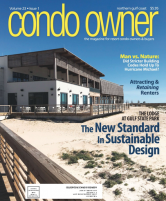Local Organizations Create Coastal Habitats
By Ashley Wright

BP’s battle to clean up coastal waters after the Deepwater Horizon Oil Spill may be diminishing, but there are still tried-and-true local warriors who continue to fight to protect their local waterways, and will continue to do so long after the spill is out of the national spotlight.
Organizations such as the ones that make up the Gulf Waterkeepers, part of the Waterkeeper Alliance, have begun initiatives like Save Our Gulf to continue fighting to protect the communities and environment from long-term devastating impacts of the disaster.
“Our Gulf Coast Waterkeepers are the front line in the evolving BP disaster,” said Kristine Stratton, executive director of Waterkeeper Alliance. “These engaged and informed community advocates are showing how important local knowledge is in responding to a spill of this magnitude.”
Gulf Coast Waterkeepers—Louisiana’s Lower Mississippi Riverkeeper and Louisiana Bayoukeeper; Alabama’s Mobile Baykeeper; and Florida’s Emerald Coastkeeper and Apalachicola Riverkeeper—have been reporting on the effectiveness of natural resource protection and clean up efforts.
Collectively, the Saveourgulf.org website offers frontline updates from Louisiana to Florida offering insight and information from local fisherman, environmental experts and on-the-ground volunteers.
For example, the Louisiana Bayoukeeper organization recently said that fishermen and others across the gulf continue to report oil, dispersant and oiled seafood to government agencies with little or no response. The organization said its reporters cited dispersed oil bubbling up in nearshore and inland waters recently.
Local Waterkeepers also continue to also seek volunteers to help them with long-termed updates of how the spill is affecting local waterways and communities. In Florida, for example, Emerald Coastkeepers are recruiting volunteers to help with long-termed monitoring of the coastlines, said the organization’s Chasidy Fisher Hobbs. Volunteers must commit to visiting the same site at least once per month.
The Alabama Coastal Foundation, another organization committed to protecting local shores, has also partnered with Mobile Baykeeper and other environmental organizations to move a new initiative forward to benefit delicate local waterways and Gulf of Mexico fisheries. The 100/1,000 Restore Coastal Alabama Project will offer finfish and shellfish stocks new, clean nursery habitat to recover rapidly from the impacts of the Deepwater Horizon Oil Spill.
“Every bit of habitat we have left we have to protect very carefully; we can’t squander any of it,” said Bill Finch, senior fellow for the The Ocean Foundation. “We have to restore the habitats that we’ve lost.”
The project will help build 100 miles of oyster reefs that will protect and promote more than 1,000 acres of coastal marsh and seagrass. The project will create jobs to build the artificial oyster reefs. It will also need the help of the thousands of people who sought volunteer opportunities during the oil spill but were sidelined due to the harmful nature of the oil and dispersants and other logistics. The program will involve local communities in the project and educate local residents and visitors on the importance of these coastal wetlands.
“All we need is the support of the public, the support of the agencies involved and the money to do this,” Finch said. “We’re rebuilding those great oyster reefs, marshes and seagrasses that play such an important role in the livelihood of the gulf. If we do this—if we act heroically to rebuild those things—in 10 years we will be living with a gulf that is more bountiful, more beautiful than the gulf that we lived with when the spill came.”
Waterkeepers has urged the federal government, U.S. Coast Guard, U.S. Environmental Protection Agency, and the coastal states’ natural resource agencies to take the lead on decisive steps to prevent future oil disasters.
“Over the course of this ongoing disaster it has become apparent that BP’s business interests, at times, take precedence to protecting the gulf and gulf coast communities,” said Lower Mississippi Riverkeeper Paul Orr. “Federal regulations put BP squarely in charge of cleaning up the oil spill for which it is responsible. Since federal and state agencies exist to protect the interests of all American citizens, we believe they should use their authority to protect the gulf environment and communities in partnership with local organizations and volunteers.”
Bookmark the permalink.
Print Version

Leave a Reply